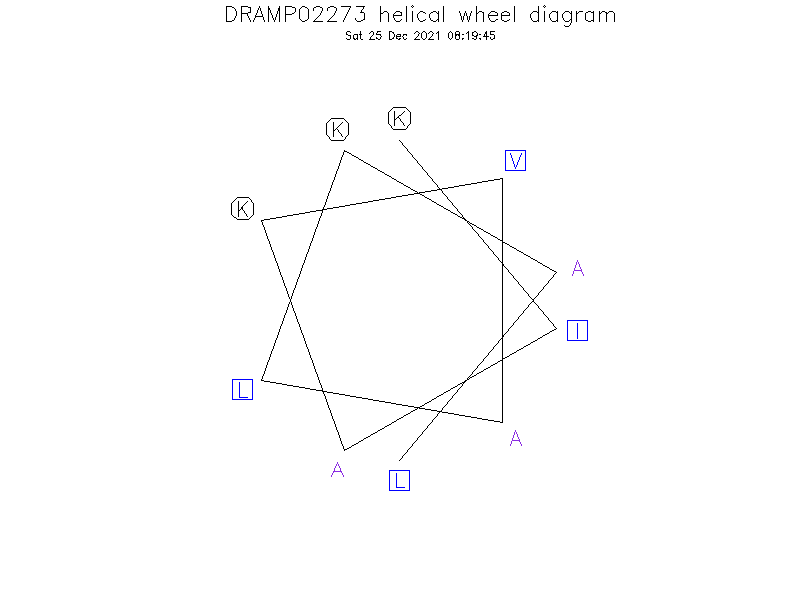General Information
-
DRAMP ID
- DRAMP02273
-
Peptide Name
- PGLa-H (chain of PYLa/PGLa A; Frogs, amphibians, animals)
-
Source
- Xenopus laevis (African clawed frog)
-
Family
- Belongs to the gastrin/cholecystokinin family (Magainin subfamily)
-
Gene
- pgla-a AND pgla-b
-
Sequence
- KIAKVALKAL
-
Sequence Length
- 10
-
Protein Existence
- Protein level
Activity Information
-
Biological Activity
- Antimicrobial, Antibacterial, Anti-Gram+, Anti-Gram-
-
Target Organism
-
- [Ref.22014884]Gram-positive bacteria: Staphylococcus aureus ATCC 25923 (MIC=8.7 µg/ml), Bacillus subtilis (MIC=14.4 µg/ml), Staphylococcus aureus (MRSA) (MIC=67.8 µg/ml);
- Gram-negative bacteria: Escherichia coli ATCC 25922 (MIC=23.6 µg/ml)
-
Hemolytic Activity
-
- [Ref.22014884]3.15% hemolytic activity at 100 μg/mL, 7.95% hemolytic activity at 200 μg/mL against rabbit red blood cells
-
Cytotoxicity
-
- Not included yet
-
Binding Target
- Not found
Structure Information
-
Linear/Cyclic
- Not included yet
-
N-terminal Modification
- Not included yet
-
C-terminal Modification
- Not included yet
-
Nonterminal Modifications and Unusual Amino Acids
- Not included yet
-
Stereochemistry
- Not included yet
-
Structure
- Not found
-
Structure Description
- Not found
-
Helical Wheel Diagram
-
PDB ID
- None
-
Predicted Structure
- There is no predicted structure for DRAMP02273.
Physicochemical Information
-
Formula
- C50H95N13O11
Absent Amino Acids
- CDEFGHMNPQRSTWY
Common Amino Acids
- AK
Mass
- 1054.38
PI
- 10.3
Basic Residues
- 3
Acidic Residues
- 0
Hydrophobic Residues
- 7
Net Charge
- +3
-
Boman Index
- 7.58
Hydrophobicity
- 1
Aliphatic Index
- 176
Half Life
-
- Mammalian:1.3 hour
- Yeast:3 min
- E.coli:2 min
Extinction Coefficient Cystines
- 0
Absorbance 280nm
- 0
Polar Residues
- 0
DRAMP02273
Comments Information
Function
- PGLa-H display a broad-spectrum of antibacterial activity against a range of Gram-positive and Gram-negative bacteria. PGLa-H shows moderate antibacterial activity against the multidrug-resistant methicillin-resistant S. aureus (MRSA) but exhibits hemolytic activity.
Tissue specificity
- Expressed by the skin glands. Synthesized in the stomach and stored in a novel granular multinucleated cell in the gastric mucosa. Stored as active, processed peptides in large granules within the granular gland secretions of the skin.
PTM
- Leucine amide at position 10.
Literature Information
- ·Literature 1
-
Title
- Isolation and characterisation of a new antimicrobial peptide from the skin of Xenopus laevis.
-
Pubmed ID
- 22014884
-
Reference
- Int J Antimicrob Agents. 2011 Dec;38(6):510-515.
-
Author
- Hou F, Li J, Pan P, Xu J, Liu L, Liu W, Song B, Li N, Wan J, Gao H.
- ·Literature 2
-
Title
- Antimicrobial peptides in the stomach of Xenopus laevis.
-
Pubmed ID
- 1717472
-
Reference
- J Biol Chem. 1991 Oct 15;266(29):19851-19857.
-
Author
- Moore KS, Bevins CL, Brasseur MM, Tomassini N, Turner K, Eck H, Zasloff M.

